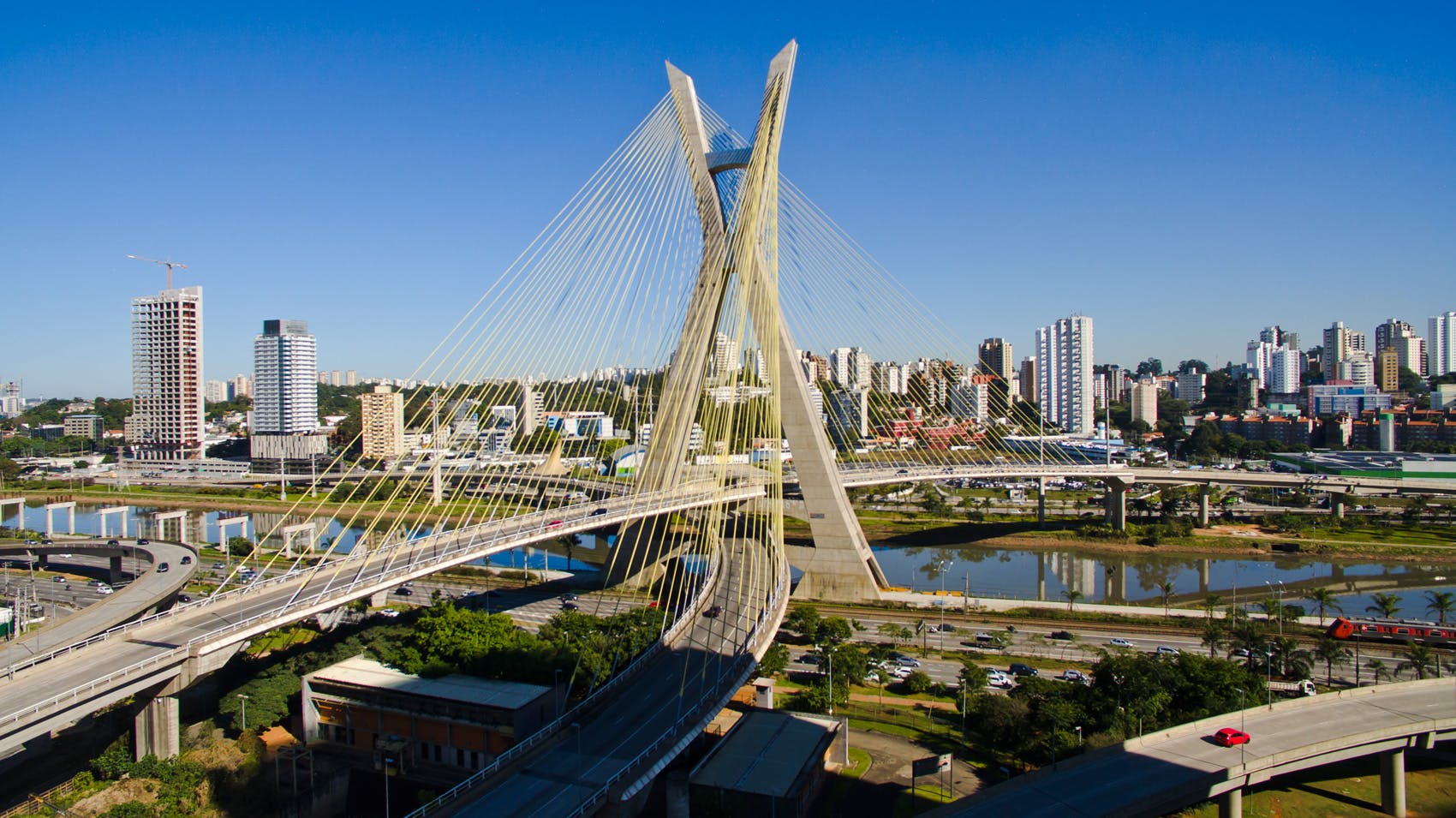Work in Brazil
As Brazil's economy and skilled workforce grow, finding a job can be challenging. However, learning Portuguese will significantly increase your chances of success
Brazil is the largest country in Latin America by area and population. It is also the seventh-largest economy in the world. The country boasts 4,600 miles of coastline and more than 60% of the Amazon rainforest, with its idyllic beaches and natural beauty of huge appeal for international workers.
Known for its colourful culture, which is influenced by its Portuguese, African, and indigenous heritage, the country is also famous for its samba music, the Brazilian Carnaval festival in Rio de Janeiro, and football.
The job market can be challenging for international workers. Visa applications can be lengthy, and there is a national preference for Brazilian citizens over foreign workers. You will also need a high level of proficiency in Portuguese, the country's official language, to be considered for a role and to get by in your day-to-day life.
However, with the right set of skills and motivation, there are plenty of job opportunities available, particularly in the metropolitan areas of São Paulo, Macaé, Rio de Janeiro, and the capital city, Brasília.
Jobs in Brazil
Brazil is a major economic power with strong agricultural, industrial, and financial sectors. The country is a member of the G20, a group of the world's largest economies, and is the world's largest producer of beef cattle, tropical fruits, and sugar cane, and a world-leading coffee producer. Brazil also has a financially powerful banking industry with a strong national currency (the Brazilian Real) and is one of the world's leading producers of hydroelectric power.
However, finding a job in Brazil can be difficult for international workers. Most companies follow the 'principle of proportionality', which requires two-thirds of all vacancies to be filled by Brazilian citizens. This can make it challenging for international workers to compete for jobs, even if they have the necessary skills and experience.
Despite these challenges, there are still opportunities for international workers in Brazil. Some of the most in-demand jobs include:
Roles that graduates may be able to fill include:
- Engineering - There is a high demand for engineers in a variety of fields, including civil engineering, mechanical engineering, and electrical engineering.
- Information technology - Brazil's technology sector is growing rapidly. There is a need for workers in IT fields such as software development, web development, and data science.
- Healthcare - Doctors, nurses, and other healthcare professionals are highly sought-after.
- Education - Teachers at all levels are highly desired.
- Science and research - Brazil is a leader in scientific research, and there is a demand for graduates in science and research fields such as biology, chemistry, and physics.
Popular graduate jobs
- Software engineer
- Data scientist
- Web developer
- Business analyst
- Financial analyst
- Marketing analyst.

How to get a job in Brazil
Finding temporary or part-time positions can be challenging, as employers often prefer to hire Brazilian citizens. If you are hoping to secure a full-time role, you should start your search from home. You should also consider sending out speculative applications to employers, including your CV and a cover letter.
The best job sites for work in Brazil are:
Summer jobs
Brazil is a popular tourist destination, and the country's tourism industry is always in need of English speakers. If you have experience working as a hotel employee, bartender, or tour guide, you may be able to find work in this sector.
If you have knowledge of working with children, you may consider working as an au pair for a Brazilian family. This can be a great way to experience Brazilian culture and earn some money at the same time.
Teaching jobs
Teaching English is one of the easiest ways for foreign applicants to find a job in Brazil's competitive job market. The highest demand for teachers is in the major cities of Rio de Janeiro and São Paulo.
Your earnings will vary depending on your location, the type of institution you work for (e.g., school, university, or private tuition), and your qualifications and experience. You'll be able to charge a higher rate if you teach a niche subject, such as medical or legal English.
To teach in Brazil, you must have:
- two years of teaching experience at the appropriate level
- a Bachelors degree in a relevant area of focus
- ����Teaching English as a Foreign Language (TEFL) certificate, if you're teaching in a private school.
Search for teaching opportunities in Brazil via:
- Cultura Inglesa
- ESL Employment
- Go Overseas - Teach English in Brazil
- International TEFL Academy - Teach English in Brazil
- The TEFL Org - Teach English in Brazil.
Internships
Brazil's major cities, such as São Paulo, offer plenty of internship opportunities for international students. Many of these internships are in the fields of marketing, business, and web development.
Fortunately, many online resources for finding internships in Brazil are written in English.
You can search for opportunities at:
- AIESEC.org
- Glassdoor - Summer intern jobs in Brazil
- GoAbroad.com - Internships in Brazil
- GoOverseas - Internships in Brazil
- Intern Brazil.
Brazilian visas
To work in Brazil, you will need a work visa and a residence permit. Your future employer will apply for a work visa on your behalf. To do this, they will need to submit the following documents to the Brazilian Ministry of Labor and Employment:
- a copy of your employment contract
- your CV
- required work documents
- a certified copy of your passport.
Once the work visa is approved, you can apply for a temporary work visa in your home country through the Brazilian embassy or consulate. It is important to secure employment before moving to Brazil, as you cannot obtain a work visa without a job offer.
A temporary work visa expires after two years but can be renewed for an additional two years. After that, your company can apply for a permanent visa for you if you intend to stay in Brazil for the long term. While you are holding a temporary work visa, you cannot change employers without permission.
Within 30 days of your arrival in Brazil, you will need to collect various documents from the federal police, including a foreigner ID card and a Brazilian taxpayer ID. You will need the Brazilian taxpayer ID to open a bank account.
It is important to apply for your visa as early as possible, as the application process can take two to three months.
For more information, see the Embassy of Brazil in London.

Language requirements
Portuguese is the official language of Brazil, and it is essential to have a good level of proficiency in Portuguese to secure employment in the country. While you do not need certification from an official language course to work in Brazil, it is highly recommended that you learn as much Portuguese as possible before moving to the country.
There are several ways to learn Portuguese. You can take classes at a local language school or online. You can also use online resources such as BBC Languages - Portuguese���ǰ���Duolingo - Learn Portuguese to brush up on your skills.
If you can find work through an international organisation, they may offer help with Portuguese as part of your employee package. This can be a great way to learn the language and to get your foot in the door of the Brazilian job market.
Explaining your qualifications to Brazilian employers
The higher education system in Brazil aligns with the Bologna system used in the UK, but there is no formal connection between the two systems. Therefore, it is important to clarify your qualifications when applying for jobs in Brazil. You can do this by providing a detailed transcript of your studies and by explaining how your qualifications are equivalent to Brazilian qualifications.
What it's like to work in Brazil
The working day in Brazil typically runs from 8am-6pm, Monday to Friday. Employees average 40 hours per week and by law, they must not exceed 44 hours.
Workers are entitled to 30 days' holiday after being in their job for a year, either taken all at once or split into parts. There are also between 9 and 12 national holidays per year depending on which state you live in.
Healthcare is provided for free by the government through the SUS (Unified Health System), and public health programmes are in place to make medication more affordable.
Find out more
- Discover what it's like to study in Brazil.
- Explore volunteer projects in South America.

